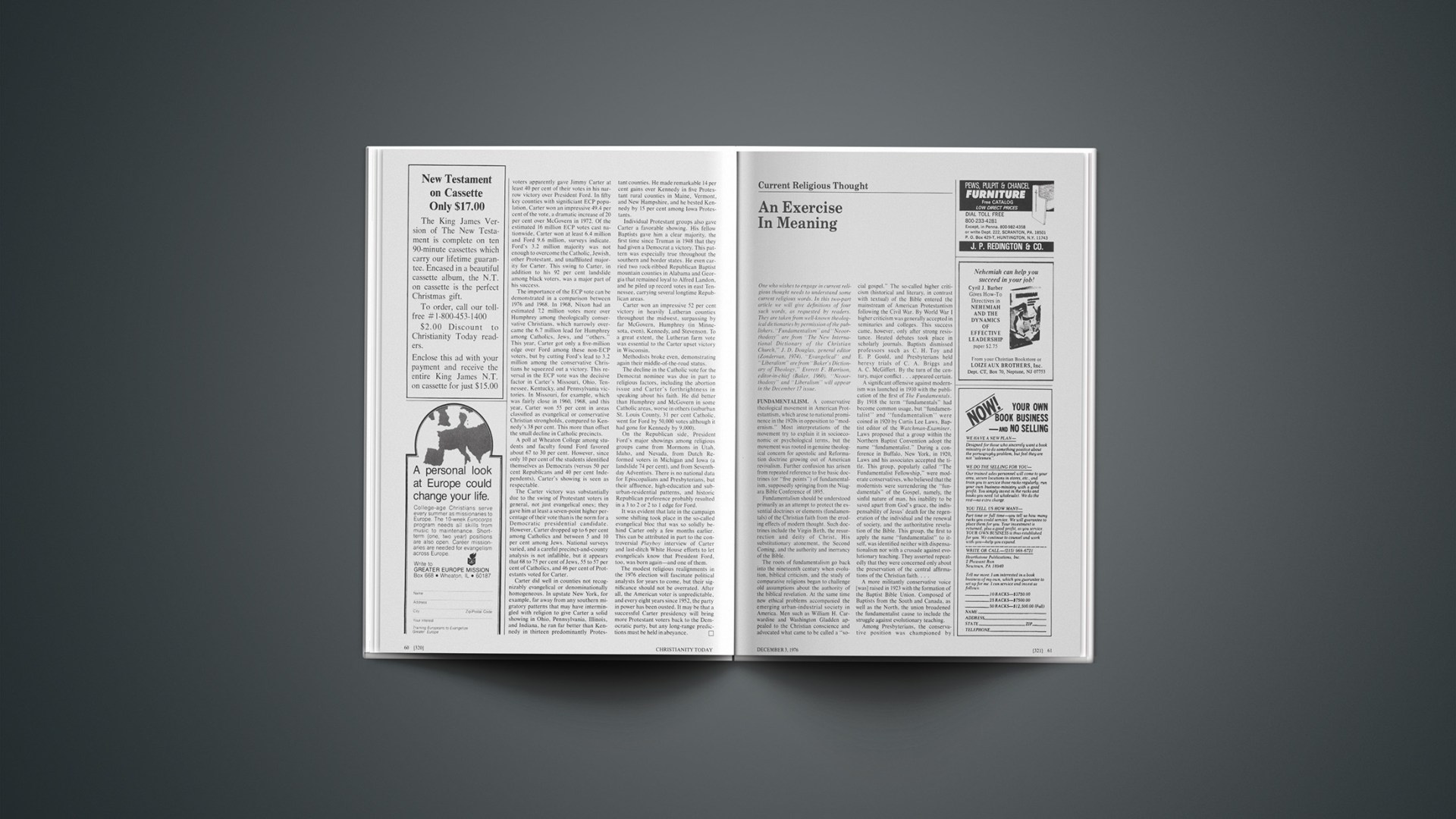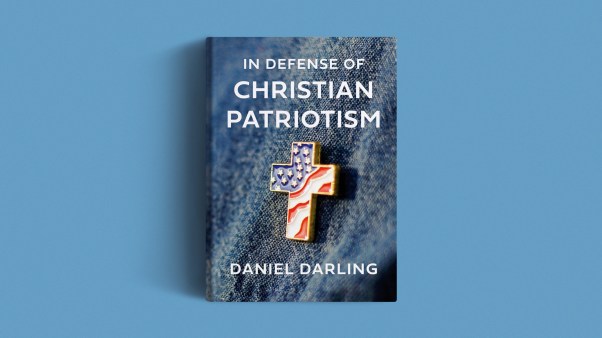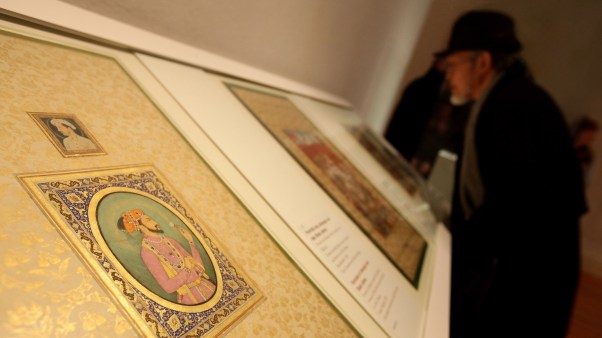Every two yearsCHRISTIANITY TODAYreports the religious aspects of the national elections and publishes a census showing the religious lineup of the new Congress. The following story updates extensive election and campaign coverage in the November 19 and preceding issues. This year’s census (right) was compiled by news assistant Brigid Spillane.
A born-again Southern Baptist deacon and Sunday-school teacher may have won the White House in the recent national election, but a record number of Catholics will be holding forth in Congress next term, according to CHRISTIANITY TODAY’S findings. Catholic representation increased by six for a total of 129 in the Ninety-Fifth Congress, the most in the nation’s history.
Overall, there were no sharp shifts in congressional religious-affiliation listings. Presbyterians continue to take it on the chin, having lost six seats (they lost twelve in 1974). This gives them a total of sixty in the new Congress. The downward trend applies also to other main-line denominational groups. The United Methodists and the United Church of Christ are each down by three, the Episcopalians by two, the Baptists by one. The Lutherans and the Churches of Christ each gained two, however. (Because of the difficulties involved in trying to pinpoint the exact Baptist, Presbyterian, and Lutheran denominations cited in affiliations, these groups have been listed generically in the census.)
In other changes, the Jewish have increased by three, the Reformed Church in America by two, the Latter-Day Saints by one, and the “Christian” or “Protestant” category by four.
Another clergyman was elected to Congress: Republican John Danforth, an ordained Episcopalian who defeated Democrat incumbent Stuart Symington, a fellow Episcopalian, in a Missouri Senate race. He joins ordained congressional incumbents who were reelected: Catholic priests Robert F. Drinan of Massachusetts and Robert J. Cornell of Wisconsin, Robert W. Edgar of Pennsylvania (United Methodist), Andrew Young of Georgia (United Church of Christ), John Buchanan of Alabama (Southern Baptist), and delegate Walter Fauntroy of Washington, D.C. (Progressive National Baptist). All but Buchanan are Democrats.
In each category, the Senators are listed first in bold face, then House members. Asterisk (*) denotes apparent winner.
Baptist (55)
Byrd (D-W.Va.)
Ford (D-Ky.)
Hatfield (R-Oreg.)
Helms (R-N.C.)
Johnston, Jr. (D-La.)
McClellan (D-Ark.)
Morgan (D-N.C.)
Talmadge (D-Ga.)
Thurmond (R-S.C.)
Andrews (D-N.C.)
Ashbrook (R-Ohio)
Barnard (D-Ga.)
Bevill (D-Ala.)
Bowen (D-Miss.)
Brinkley (D-Ga.)
Broyhill (R-N.C.)
Buchanan, Jr. (R-Ala.)
Burlison (D-Mo.)
Carr (D-Mich.)
Carter (R-Ky.)
Cochran (R-Miss.)
Collins (D-Ill.)
Collins (R-Tex.)
Conyers, Jr. (D-Mich.)
Daniel (D-Va.)
Diggs, Jr. (D-Mich.)
Fauntroy (D-D.C.)
Ford (D-Tenn.)
Gammage (D-Tex.)
Ginn (D-Ga.)
Gore, Jr. (D-Tenn.)
Grassley (R-Iowa)
Hefner (D-N.C.)
Hightower (D-Tex.)
Hubbard, Jr. (D-Ky.)
Ichord (D-Mo.)
Jenkins (D-Ga.)
Jones (D-N.C.)
Jordan (D-Tex.)
Long (D-La.)
Lott (R-Miss.)
Mann (D-S.C.)
Mathis (D-Ga.)
Mattox (D-Tex.)
Mollohan (D-W.Va.)
Natcher (D-Ky.)
Nix (D-Pa.)
Pepper (D-Fla.)
Perkins (D-Ky.)
Risenhoover (D-Okla.)
Runnels (D-N.Mex.)
Shipley (D-Ill.)
Teague (D-Tex.)
Wilson (R-Calif.)
Whitley (D-N.C.)
Presbyterian (60)
Anderson (D-Minn.)
Baker, Jr. (R-Tenn.)
Bellmon (R-Okla.)
Bentsen (D-Tex.)
Case (R-N.J.)
Chiles (D-Fla.)
Church (D-Idaho)
Culver (D-Iowa)
Curtis (R-Nebr.)
Glenn (D-Ohio)
Jackson (D-Wash.)
Pearson (R-Kans.)
Stennis (D-Miss.)
Williams, Jr. (D-N.J.)
Applegate (D-Ohio)
Breckenridge (D-Ky.)
Broomfield (R-Mich.)
Brown (R-Ohio)
Brown (R-Mich.)
Cornwell (D-Ind.)
Duncan (R-Tenn.)
Eckhardt (D-Tex.)
Edwards (R-Ala.)
Evans (D-Colo.)
Fountain (D-N.C.)
Fuqua (D-Fla.)
Gibbons (D-Fla.)
Hammerschmidt (R-Ark.)
Harsha (R-Ohio)
Hillis (R-Ind.)
Holt (R-Md.)
Horton (R-N.Y.)
Johnson (D-Calif.)
Johnson (R-Colo.)
Jones (D-Tenn.)
Kelly (R-Fla.)
Kemp (R-N.Y.)
Kindness (R-Ohio)
Long (D-Md.)
Martin (R-N.C.)
McCloskey, Jr. (R-Calif.)
McEwen (R-N.Y.)
Meyner (D-N.J.)
Moorhead (R-Calif.)
Preyer (D-N.C.)
Pritchard (R-Wash.)
Rahall, II (D-W.Va.)
Rose (D-N.C.)
Schulze (R-Pa.)
Seiberling (D-Ohio)
Slack (D-W.Va.)
Stratton (D-N.Y.)
Thone (R-Nebr.)
Ullman (D-Oreg.)
Vander Jagt (R-Mich.)
Walker (R-Pa.)
Wampler (R-Va.)
Watkins (D-Okla.)
Whitten (D-Miss.)
Wright (D-Tex.)
Christian Church (Disciples) (5)
Bafalis (R-Fla.)
Bennett (D-Fla.)
Evans (D-Ga.)
Skelton (D-Mo.)
Winn, Jr. (R-Kans.)
United Methodist (80)
Bayh (D-Ind.)
Bumpers (D-Ark.)
Clark (D-Iowa)
Dole (R-Kans.)
Eastland (D-Miss.)
Huddleston (D-Ky.)
Inouye (D-Hawaii)
Long (D-La.)
Lugar (R-Ind.)
McClure (R-Idaho)
McGovern (D-S.Dak.)
Metcalf (D-Mont.)
Nelson (D-Wis.)
Nunn (D-Ga.)
Riegle, Jr. (D-Mich.)
Sasser (D-Tenn.)
Schmitt (R-N.Mex.)
Scott (R-Va.)
Sparkman (D-Ala.)
Tower (R-Tex.)
Abdnor (R-S.Dak.)
Allen (D-Tenn.)
Ammerman (D-Pa.)
Beard (R-Tenn.)
Bedell (D-Iowa)
Brademas (D-Ind.)
Brooks (D-Tex.)
Brown, Jr. (D-Calif.)
Chappell, Jr. (D-Fla.)
Chisholm (D-N.Y.)
Conable, Jr. (R-N.Y.)
Corman (D-Calif.)
Crane (R-Ill.)
Davis (D-S.C.)
Devine (R-Ohio)
Dickinson (R-Ala.)
Duncan (D-Oreg.)
Edgar (D-Pa.)
English (D-Okla.)
Fithian (D-Ind.)
Flynt, Jr. (D-Ga.)
Goodling (R-Pa.)
Gudger (D-N.C.)
Hamilton (D-Ind.)
Hawkins (D-Calif.)
Holland (D.-S.C.)
Huckaby (D-La.)
Jenrette, Jr. (D-S.C.)
Keys (D-Kans.)
Lent (R-N.Y.)
Mahon (D-Tex.)
McDonald (D-Ga.)
Miller (R-Ohio)
Mineta (D-Calif.)
Mitchell (R-N.Y.)
Nichols (D-Ala.)
Pickle (D-Tex.)
Quillen (R-Tenn.)
Rhodes (R-Ariz.)
Roberts (D-Tex.)
Rogers (D-Fla.)
Sebelius (R-Kans.)
Sharp (D-Ind.)
Sikes (D-Fla.)
Skubitz (R-Kans.)
Smith (D-lowa)
Smith (R-Nebr.)
Staggers (D-W.Va.)
Steed (D-Okla.)
Steers, Jr. (R-Md.)
Stockman (R-Mich.)
Stokes (D-Ohio)
Taylor (R-Mo.)
Treen (R-La.)
Waggoner, Jr. (D-La.)
Whitehurst (R-Va.)
Wiggins (R-Calif.)
Wilson (D-Tex.)
Wylie (R-Ohio)
Young (R-Fla.)
Jewish (27)
Javits (R-N.Y.)
Metzenbaum (D-Ohio)
Ribicoff (D-Conn.)
Stone (D-Fla.)
Zorinsky (D-Neb.)
Beilenson (D-Calif.)
Eilberg (D-Pa.)
Gilman (R-N.Y.)
Glickman (D-Kans.)
Gradison, Jr. (R-Ohio)
Holtzman (D-N.Y.)
Koch (D-N.Y.)
Krebs (D-Calif.)
Lehman (D-Fla.)
Levitas (D-Ga.)
Marks (R-Pa.)
Mikva (D-Ill.)*
Ottinger (D-N.Y.)
Richmond (D-N.Y.)
Rosenthal (D-N.Y.)
Scheuer (D-N.Y.)
Solarz (D-N.Y.)
Spellman (D-Md.)
Waxman (D-Calif.)
Weiss (D-N.Y.)
Wolff (D-N.Y.)
Yates (D-Ill.)
Lutheran (16)
Hollings (D-S.C.)
Magnuson (D-Wash.)
Armstrong (R-Colo.)
Badham (R-Calif.)
Bergland (D-Minn.)
Clausen (R-Calif.)
Dicks (D-Wash.)
Ertel (D-Pa.)
Frey, Jr. (R-Fla.)
Haggedorn (R-Minn.)
Marlenee (R-Mont.)
Milford (D-Tex.)
Quie (R-Minn.)
Simon (D-Ill.)
Snyder (R-Ky.)
Spence (R-S.C.)
Episcopal (64)
Brooke (R-Mass.)
Byrd, Jr. (I-Va.)
Chaffe (R-R.I.)
Danforth (R-Mo.)
Goldwater (R-Ariz.)
Hansen (R-Wyo.)
Haskell (D-Colo.)
Hathaway (D-Maine)
Heinz III (R-Pa.)
Mathias, Jr. (R-Md.)
Matsunaga (D-Hawaii)
Pell (D-R.I.)
Proxmire (D-Wis.)
Roth, Jr. (R-Del.)
Stevens (R-Alaska)
Wallop (R-Wyo.)
Weicker, Jr. (R-Conn.)
Adams (D-Wash.)
Alexander (D-Ark.)
Anderson (D-Calif.)
Andrews (R-N.Dak.)
Ashley (D-Ohio)
Aspin (D-Wis.)
Bolling (D-Mo.)
Butler (R-Va.)
Byron (D-Md.)
Coughlin (R-Pa.)
Daniel, Jr. (R-Va.)
Derrick (D-S.C.)
Edwards (R-Okla.)
Evans, Jr. (R-Del.)
Fish, Jr. (R-N.Y.)
Flowers (D-Ala.)
Goldwater, Jr. (R-Calif.)
Hughes (D-N.J.)
Ireland (D-Fla.)
Kasten, Jr. (R-Wis.)
Ketchum (R-Calif.)
Kostmayer (D-Pa.)
Leach (R-Iowa)
Lloyd (D-Calif.)
McFall (D-Calif.)
McKinney (R-Conn.)
Mitchell (D-Md.)
Meeds (D-Wash.)*
Montgomery (D-Miss.)
Moore (R-La.)
Moorhead (D-Pa.)
Myers (R-Ind.)
Myers (R-Pa.)
Neal (D-N.C.)
Pattison (D-N.Y.)
Regula (R-Ohio)
Reuss (D-Wis.)
Satterfield, III (D-Va.)
Sawyer (R-Mich.)
Steiger (R-Wis.)
Traxler (D-Mich.)
Trible, Jr. (R-Va.)
Van Deerlin (D-Calif.)
White (D-Tex.)
Wirth (D-Colo.)
Wydler (R-N.Y.)
Young (R-Alaska)
United Church Of Christ (22) (Includes Congregational)
Burdick (D-N.Dak.)
Griffin (R-Mich.)
Humphrey (D-Minn.)
Stafford (R-Vt.)
Akaka (D-Hawaii)
Baucus (D-Mont.)
Bingham (D-N.Y.)
Downey (D-N.Y.)
Emery (R-Maine)
Findley (R-Ill.)
Ford (D-Mich.)
Fraser (D-Minn.)
Jeffords (R-Vt.)
Lloyd (D-Tenn.)
Patterson (D-Calif.)
Pike (D-N.Y.)
Railsback (R-Ill.)
Schroeder (D-Colo.)
Shuster (R-Pa.)
Thornton (D-Ark.)
Wilson (D-Calif.)
Young (D-Ga.)
Eastern Orthodox (4)
Abourezk (D-S.Dak.)
Sarbanes (D-Md.)
Tsongas (D-Mass.)
Yatron (D-Pa.)
Governors
Roman Catholic
Apodaca (D-N.Mex.)
Brown, Jr. (D-Calif.)
Byrne (D-N.J.)
Carey (D-N.Y.)
Castro (D-Ariz.)
Edwards (D-La.)
Garrahy (D-R.I.)
Grasso (D-Conn.)
Judge (D-Mont.)
Kneip (D-S.Dak.)
Longley (I-Maine)
Lucey (D-Wis.)
O’Callaghan
(D-Nev.)
Perpich (D-Minn.)
Teasdale (D-Mo.)
Methodist
Blanton (D-Tenn.)
Boren (D-Okla.)
Edwards (R-S.C.)
Hammond (R-Alaska)
Wallace (D-Ala.)
United Church of Christ
Ariyoshi (D-Hawaii)
Godwin, Jr. (R-Va.)
Milliken (R-Mich.)
Episcopal
Briscoe (D-Tex.)
du Pont, IV (R-Del.)
Exon (D-Nebr.)
Herschler (D-Wyo.)
Eastern Orthodox
Dukakis (D-Mass.)
Presbyterian
Askew (D-Fla.)
Bennett (R-Kans.)
Carroll (D-Ky.)
Hunt, Jr. (D-N.C.)
Pryor (D-Ark.)
Rhodes (R-Ohio)
Thompson (R-Ill.)
Jewish
Mandel (D-Md.)
Shapp (D-Pa.)
Lutheran
Andrus (D-Idaho)
Bowen (R-Ind.)
Link (D-N.Dak.)
Baptist
Busbee (D-Ga.)
Finch (D-Miss.)
Ray (D-Wash.)
Rockefeller, IV (D-W.Va.)
Thomson, Jr. (R-N.H.)
Christian Church (Disciples)
Ray (R-Iowa)
Latter-Day Saints
Matheson (D-Utah)
Unitarian-Universalist
Lamm (D-Colo.)
Snelling (R-Vt.)
Unaffiliated
Straub (D-Oreg.)
Roman Catholic (129)
Bartlett (R-Okla.)
Biden, Jr. (D-Del.)
DeConcini (D-Ariz.)
Domenici (R-N.Mex.)
Durkin (D-N.H.)
Eagleton (D-Mo.)
Kennedy (D-Mass.)
Laxalt (R-Nev.)
Leahy (D-Vt.)
McIntyre (D-N.H.)
MeIcher (D-Mont.)
Moynihan (D-N.Y.)
Muskie (D-Maine)
Addabbo (D-N.Y.)
Ambro (D-N.Y.)
Annunzio (D-Ill.)
Archer (R-Tex.)
Baldus (D-Wis.)
Bauman (R-Md.)
Beard (D-R.I.)
Biaggi (D-N.Y.)
Blouin (D-Iowa)
Boggs (D-La.)
Boland (D-Mass.)
Bonior (D-Mich.)
Breaux (D-La.)
Brodhead (D-Mich.)
Burke (R-Fla.)
Burke (D-Mass.)
Carney (D-Ohio)
Cavanaugh (D-Nebr.)
Clay (D-Mo.)
Conte (R-Mass.)
Corcoran (R-Ill.)
Cornell (D-Wis.)
Cotter (D-Conn.)
D’Amours (D-N.H.)
Dent (D-Pa.)
de la Garza (D-Tex.)
Delaney (D-N.Y.)
Derwinski (R-Ill.)
Dingell (D-Mich.)
Doad (D-Conn.)
Dornan (R-Calif.)
Drinan (D-Mass.)
Early (D-Mass.)
Erlenborn (R-Ill.)
Evans (D-Ind.)
Fary (D-Ill.)
Flood (D-Pa.)
Florio (D-N.J.)
Foley (D-Wash.)
Gaydos (D-Pa.)
Giaimo (D-Conn.)
Gonzalez (D-Tex.)
Hanley (D-N.Y.)
Harkin (D-Iowa)
Harrington (D-Mass.)
Harris, II (D-Va.)
Heckler (R-Mass.)
Hollenbeck (R-N.J.)
Howard (D-N.J.)
Hyde (R-Ill.)
Jacobs, Jr. (D-Ind.)
Jones (D-Okla.)
Kazen, Jr. (D-Tex.)
Kildee (D-Mich.)
LaFalce (D-N.Y.)
Lagomarsino (R-Calif.)
Lederer (D-Pa.)
LeFante (D-N.J.)
Leggett (D-Calif.)
Lujan, Jr. (R-N.Mex.)
Luken (D-Ohio)
Madigan (R-Ill.)
Markey (D-Mass.)
Mazzoli (D-Ky.)
McDade (R-Pa.)
McHugh (D-N.Y.)
Metcalfe (D-Ill.)
Mikulski (D-Md.)
Miller (D-Calif.)
Minish (D-N.J.)
Moakley (D-Mass.)
Moffett (D-Conn.)
Mottl (D-Ohio)
Murphy (D-Pa.)
Murphy (D-N.Y.)
Murphy (D-Ill.)
Murtha (D-Pa.)
Myers (D-Pa.)
Nedzi (D-Mich.)
Nolan (D-Minn.)
Nowak (D-N.Y.)
Oakar (D-Ohio)
Oberstar (D-Minn.)
Obey (D-Wis.)
O’Brien (R-Ill.)
O’Neill, Jr. (D-Mass.)
Panetta (D-Calif.)
Patten (D-N.J.)
Pressler (R-S.Dak.)
Price (D-Ill.)
Rangel (D-N.Y.)
Rinaldo (R-N.J.)
Rodino, Jr. (D-N.J.)
Roe (D-N.J.)
Rooney (D-Pa.)
Rostenkowski (D-Ill.)
Roybal (D-Calif.)
Rudd (R-Ariz.)
Ruppe (R-Mich.)
Russo (D-Ill.)
Ryan (D-Calif.)
Santini (D-Nev.)
Sarasin (R-Conn.)
Stanton (R-Ohio)
St. Germain (D-R.I.)
Thompson, Jr. (D-N.J.)
Tonry (D-La.)
Vanik (D-Ohio)
Vento (D-Minn.)
Volkmer (D-Mo.)
Walgren (D-Pa.)
Walsh (R-N.Y.)
Whalen, Jr. (R-Ohio)
Young (D-Mo.)
Young (D-Tex.)
Zablocki (D-Wis.)
Unitarian-Universalist (11)
Gravel (D-Alaska)
Packwood (R-Oree.)
Stevenson, III (D-Ill.)
Blanchard (D-Mich.)
Burton (D-Calif.)
Burton (D-Calif.)
Cohen (R-Maine)
Edwards (D-Calif.)
Fisher (D-Va.)
Poage (D-Tex.)
Stark (D-Calif.)
Churches Of Christ (6)
Allen (D-Ala.)
Burleson (D-Tex.)
Flippo (D-Ala.)
Hall, Jr. (D-Tex.)
Latta (R-Ohio)
Sisk (D-Calif.)
Latter-Day Saints (11)
Cannon (D-Nev.)
Garn (R-Utah)
Hatch (R-Utah)
Young (R-N.Dak.)
Burgener (R-Calif.)
Clawson (R-Calif.)
Hansen (R-Idaho)
Heftel (D-Hawaii)
Marriott (R-Utah)
McKay (D-Utah)
Udall (D-Ariz.)
Unaffiliated (5)
Hayakawa (R-Calif.)
Frenzel (R-Minn.)
Kastenmeier (D-Wis.)
McCormack (D-Wash.)
Zeferetti (D-N.Y.)
Christian Science (3)
Percy (R-Ill.)
McClory (R-Ill.)
Rousselot (R-Calif.)
Others
Apostolic Christian
Michel (R-Ill.)
Assyrian Catholic Church of the East
Benjamin, Jr. (D-Ind.)
Bible Church
Quayle (R-Ind.)
Christian Methodist Episcopal
Burke (D-Calif.)
Churches of God in North America
Guyer (R-Ohio)
Evangelical Free
Anderson (R-Ill.)
Cederbere (R-Mich.)
Free Methoaist
Symms (R-Idaho)
Reformed Church in America
Caputo (R-N.Y.)
Maguire (D-N.J.)
Reorganized Church of Latter-Day Saints
Tucker (D-Ark.)
Schwenkfelder Schweiker (R-Pa.)
Seventh-Day Adventist
Pettis (R-Calif.)
Stump (D-Ariz.)
Seventh-Day Baptist
Randolph (D-W.Va.)
Society of Friends
Forsythe (R-N.J.)
Robinson (R-Va.)
‘Christian’ Or ‘Protestant’ (21) (No Specific Denomination)
Cranston (D-Calif.)
Hart (D-Colo.)
AuCoin (D-Oreg.)
Badillo (D-N.Y.)
Bonker (D-Wash.)
Cleveland (R-N.H.)
Coleman (R-Mo.)
Danielson (D-Calif.)
Dellums (D-Calif.)
Fascell (D-Fla.)
Fenwick (R-N.J.)
Gephardt (D-Mo.)
Hannaford (D-Calif.)
Krueger (D-Tex.)
Lundine (D-N.Y.)
Moss (D-Calif.)
Pease (D-Ohio)
Pursell (R-Mich.)*
Roncalio (D-Wyo.)
Studds (D-Mass.)
Weaver (D-Oreg.)
Richard G. Lugar, the Republican who defeated Democrat incumbent Vance Hartke in the Indiana contest for the U.S. Senate, lists himself as a United Methodist lay minister. Hartke belongs to the Lutheran Church-Missouri Synod.
There was a lot of talk this year about organized campaigns to get avowed Christians elected to public office. CHRISTIANITY TODAY found no single nationally coordinated organization carrying out this aim. There were, however, local and regional pockets of such activities involving evangelical groups. The most prominent of the groups was perhaps California Christians Active Politically (CCAP, pronounced “see-cap”).
CCAP, an offshoot of another group known as Creative Ministries (with which it shared staff and telephones in Walnut Creek, California), was headed by Pat Matrisciana, a former staffer with Campus Crusade for Christ and the Berkeley-based Christian World Liberation Front of the Jesus-movement era. Its stated purpose was to help get Christians elected to office. It provided support to ten of sixteen candidates it listed as “qualified Christians” in California running for state and national offices. Four of the ten were elected to state office. CCAP’s support included fund-raising drives, rallies, campaign consultation, and direct-mail advertising, according to Matrisciana. Other former Campus Crusade staffers joined him in the effort.
Candidates backed by CCAP had to meet the qualifications of elders in the third chapter of First Timothy, and their political opinions had to be based on the teachings of the Bible, said Matrisciana. Most of those backed were Republicans, but party affiliation did not matter as long as the candidates met biblical qualifications, the CCAP people insisted.
Singer-entertainer Pat Boone headed the CCAP executive committee. Other members included: San Diego pastor Tim LaHaye, Full Gospel promoter George Otis, prophecy author Hal Lindsey, Frank White of Knott’s Berry Farm, state assemblyman Bob Burke (he lost his election race), Bill Voit of the Voit Rubber Company, publisher Bob Hawkins of Harvest House, and broadcaster-author Margaret Hardesty.
Shortly before the election the American Jewish Committee (AMJ), expressing displeasure at religion-oriented campaign activities, released a list of twenty-one apparently born-again congressional candidates being promoted by evangelical groups. Only two won: Republican Robert Badham, a Lutheran in predominantly Republican Orange County, California, who defeated Judith Hall, a Jew, and Eldon D. Rudd of Phoenix, a Catholic and retired FBI agent who squeaked by his Democrat opponent by only 700 votes to take the seat vacated by John Conlan, an evangelical defeated in the primaries in his bid for the Senate.
Rabbi Marc Tanenbaum of the AMJ suggested that the AMJ’s publicity had a role in the defeat of most of those listed. He told Los Angeles Times religion reporter Russell Chandler that he felt “the notion of creating a ‘Christian Congress’ has not died, though in this election it has suffered a substantial setback.”
Interviewed by Chandler, some of the winners and losers in congressional races said that the “Christian issue” had been a factor though not a decisive one.
In a New York congressional race, Presbyterian minister William Harter failed to unseat Democrat Matthew McHugh, a Catholic. Other losers included two former baseball stars known for their evangelical witness, both Republicans: Wilmer Mizell (Christian and Missionary Alliance), who failed to regain the North Carolina congressional seat he lost in 1974, and Bobby Richardson (“independent evangelical”), who lost in South Carolina.
Benjamin Bubar was also among the losers. The superintendent of the Maine Christian Civic League ran for the presidency on the Prohibition party ticket, managing to garner 25,000 votes in nine states. “Church leaders let us down,” lamented a party leader.
In Minnesota, Catholic Richard Nolan was reelected to Congress despite attacks by challenger James Anderson linking him to Transcendental Meditation. Anderson accused Nolan of attempting to “convert fellow congressmen to the guru’s strange practices” and of supporting the teaching of atheism.
In a shift that will send Minnesota governor Wendell Anderson, a United Presbyterian, to the Senate to replace Vice President-elect Walter Mondale (also a United Presbyterian), Lieutenant Governor Rudy Perpich will move up to become the state’s first Catholic governor.
A number of issues that were up for vote were followed closely by church groups:
• California voters defeated a proposal to permit greyhound racing, and they rejected by a 5 to 3 margin Proposition 14, a measure designed to facilitate union organizing of farm workers (both sides spent more than $1.5 million on the campaign; many church social-action units backed the proposition).
• A proposal to legalize slot machines was turned down in Delaware.
• Casino gambling in Atlantic City was approved by New Jersey voters despite widespread but underfinanced (less than $20,000) church opposition (see editorial, page 36). As a result, some church groups around the nation are threatening to cancel meetings scheduled to be held in the city.
• State lotteries were endorsed in Colorado and Vermont, and Las Vegas Nights using gambling devices were okayed for charities in New York City.
• Measures to restrict the use of throwaway bottles and cans, fought by the beer and liquor interests among others, were adopted in Michigan and Maine but defeated in Colorado and Massachusetts.
• Sunday-closing laws were repealed in Maryland counties adjacent to Washington, D.C., and in Massachusetts, where voters agreed to allow absentee voting by persons whose religious convictions conflict with election dates.
• Massachusetts voters also passed an Equal Rights Amendment but soundly rejected a gun-control proposal.
• Parochaid-type proposals that would qualify students in independent colleges and universities for state aid lost in Nebraska and Alaska.
The Faithful: How They Voted
Veteran election-statistics analyst Albert J. Menendez, a journalist in Washington, D.C., made a study of the results of the recent presidential election. In it he attempted to track the religion factor in voting patterns. The following information is excerpted from the report he filed.
America’s normally Republican evangelical-conservative Protestant (ECP) voters apparently gave Jimmy Carter at least 40 per cent of their votes in his narrow victory over President Ford. In fifty key counties with significiant ECP population, Carter won an impressive 49.4 per cent of the vote, a dramatic increase of 20 per cent over McGovern in 1972. Of the estimated 16 million ECP votes cast nationwide, Carter won at least 6.4 million and Ford 9.6 million, surveys indicate. Ford’s 3.2 million majority was not enough to overcome the Catholic, Jewish, other Protestant, and unaffiliated majority for Carter. This swing to Carter, in addition to his 92 per cent landslide among black voters, was a major part of his success.
The importance of the ECP vote can be demonstrated in a comparison between 1976 and 1968. In 1968, Nixon had an estimated 7.2 million votes more over Humphrey among theologically conservative Christians, which narrowly overcame the 6.7 million lead for Humphrey among Catholics, Jews, and “others.” This year, Carter got only a five-million edge over Ford among these non-ECP voters, but by cutting Ford’s lead to 3.2 million among the conservative Christians he squeezed out a victory. This reversal in the ECP vote was the decisive factor in Carter’s Missouri, Ohio, Tennessee, Kentucky, and Pennsylvania victories. In Missouri, for example, which was fairly close in 1960, 1968, and this year, Carter won 55 per cent in areas classified as evangelical or conservative Christian strongholds, compared to Kennedy’s 38 per cent. This more than offset the small decline in Catholic precincts.
A poll at Wheaton College among students and faculty found Ford favored about 67 to 30 per cent. However, since only 10 per cent of the students identified themselves as Democrats (versus 50 per cent Republicans and 40 per cent Independents), Carter’s showing is seen as respectable.
The Carter victory was substantially due to the swing of Protestant voters in general, not just evangelical ones; they gave him at least a seven-point higher percentage of their vote than is the norm for a Democratic presidential candidate. However, Carter dropped up to 6 per cent among Catholics and between 5 and 10 per cent among Jews. National surveys varied, and a careful precinct-and-county analysis is not infallible, but it appears that 68 to 75 per cent of Jews, 55 to 57 per cent of Catholics, and 46 per cent of Protestants voted for Carter.
Carter did well in counties not recognizably evangelical or denominationally homogeneous. In upstate New York, for example, far away from any southern migratory patterns that may have intermingled with religion to give Carter a solid showing in Ohio, Pennsylvania, Illinois, and Indiana, he ran far better than Kennedy in thirteen predominantly Protestant counties. He made remarkable 14 per cent gains over Kennedy in five Protestant rural counties in Maine, Vermont, and New Hampshire, and he bested Kennedy by 15 per cent among Iowa Protestants.
Individual Protestant groups also gave Carter a favorable showing. His fellow Baptists gave him a clear majority, the first time since Truman in 1948 that they had given a Democrat a victory. This pattern was especially true throughout the southern and border states. He even carried two rock-ribbed Republican Baptist mountain counties in Alabama and Georgia that remained loyal to Alfred Landon, and he piled up record votes in east Tennessee, carrying several longtime Republican areas.
Carter won an impressive 52 per cent victory in heavily Lutheran counties throughout the midwest, surpassing by far McGovern, Humphrey (in Minnesota, even), Kennedy, and Stevenson. To a great extent, the Lutheran farm vote was essential to the Carter upset victory in Wisconsin.
Methodists broke even, demonstrating again their middle-of-the-road status.
The decline in the Catholic vote for the Democrat nominee was due in part to religious factors, including the abortion issue and Carter’s forthrightness in speaking about his faith. He did better than Humphrey and McGovern in some Catholic areas, worse in others (suburban St. Louis County, 31 per cent Catholic, went for Ford by 50,000 votes although it had gone for Kennedy by 9,000).
On the Republican side, President Ford’s major showings among religious groups came from Mormons in Utah, Idaho, and Nevada, from Dutch Reformed voters in Michigan and Iowa (a landslide 74 per cent), and from Seventh-day Adventists. There is no national data for Episcopalians and Presbyterians, but their affluence, high-education and suburban-residential patterns, and historic Republican preference probably resulted in a 3 to 2 or 2 to 1 edge for Ford.
It was evident that late in the campaign some shifting took place in the so-called evangelical bloc that was so solidly behind Carter only a few months earlier. This can be attributed in part to the controversial Playboy interview of Carter and last-ditch White House efforts to let evangelicals know that President Ford, too, was born again—and one of them.
The modest religious realignments in the 1976 election will fascinate political analysts for years to come, but their significance should not be overrated. After all, the American voter is unpredictable, and every eight years since 1952, the party in power has been ousted. It may be that a successful Carter presidency will bring more Protestant voters back to the Democratic party, but any long-range predictions must be held in abeyance.










